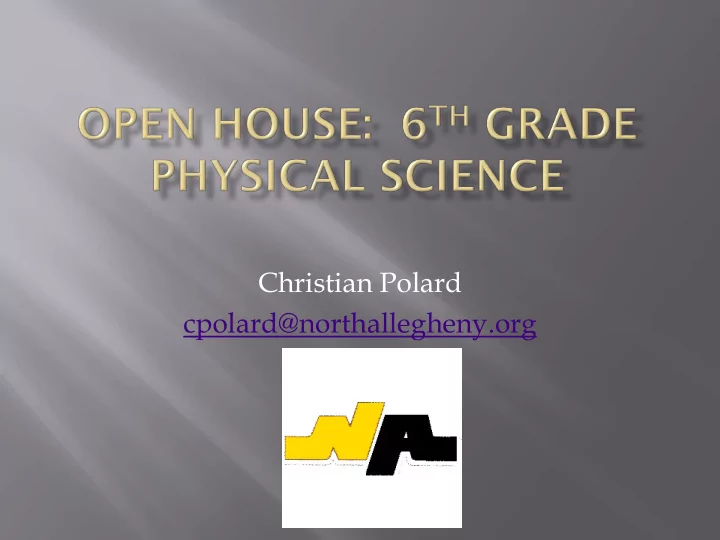

Christian Polard cpolard@northallegheny.org
Textbook: Glencoe/McGraw-Hill Website: http://glencoe.mcgraw-hill.com/sites/007877846x/ Online Resources Online Textbook Interactive Tutor Chapter Review Quizzes WebQuest/Labs
Every student received a copy of the textbook Every chapter of the textbook is available on Blackboard
Sixth grade students are encouraged to access Mr. Polard’s Blackboard site for access to: the online textbook, vocabulary and notes PowerPoint, an electronic copy of the science packet, and the homework calendar. Username: (same as NA computer login username) Password: (same as NA computer password) Students received a handout about this process. Feel free to grab a copy of the handout tonight.
Additional help for students
Access using the NA Student Data Portal The following codes will be used when entering grades: 0: The student attempted to complete the assignment but earned zero points. M: The student did not complete the assignment, and he/she may not turn it in for credit. X: The student is exempt from completing the assignment, and it will not affect his/her grade.
Students should write all of their assignments in their assignment book. Please have your students check the front board. Homework is posted daily. Assignments will also be posted on the calendar in Blackboard www.northallegheny.org
Science is a way of knowing. Scientific disciplines share a common method for testing hypothesis in order to gain knowledge. 6 th Grade – Physical Science 7 th Grade – Life Science 8 th Grade – Earth and Space Science Curriculum design and delivery is based on these principles: Research based methods 1. Continuously evaluated and updated 2. Emphasis on learning process skills 3. Focus on learning discipline-specific content 4.
Chapter 1 THE NATURE OF Chapter 3 ATOMS, ELEMENTS, SCIENCE: and the PERIODIC TABLE: UNIT 1 UNIT 2 Section 1 What is science? Section 1 Structure of Matter Section 2 Science in Action Section 2 The Simplest Matter Section 3 Models in Science LAB: Elements and the Periodic Table Section 4 Evaluation Scientific Explanation Section 3 Compounds and Mixtures LAB: What is the right answer? LAB: Mystery Mixture LAB: Identifying Parts of an Investigation Chapter 2 MEASUREMENT: Chapter 4 STATES OF MATTER: UNIT 1 UNIT 2 Section 1 Description and Measurement Section 1 Matter Section 2 SI Units Section 2 Changes of State LAB: Scale Drawing LAB: The Water Cycle Section 3 Drawings, Tables and Graphs Section 3 Behavior of Fluids LAB: Pace Yourself LAB: Design Your Own Ship
Chapter 11 FORCES and Chapter 5 MATTER -PROPERTIES and CHANGES: NEWTON’S LAWS : UNIT 2 Unit 4 Section 1 Physical Properties Section 1 Newton’s First Law Section 2 Chemical Properties Section 2 Newton’s Second Law Section 3 Physical and Chemical Changes Section 3 Newton’s Third Law LAB: Sunset in a Bag LAB: Balloon Races LAB: Homemade pH Scale LAB: Modeling Motion in Two Directions Chapter 10 MOTION and MOMENTUM: AGRICULTURE SCIENCE: UNIT 3 (Agriculture Web Quest) Section 1 What is motion? Natural resource distribution Section 2 Acceleration Agriculture and standard of living Section 3 Momentum PA specific agricultural topics LAB: Collisions Agricultural systems and human/natural resources LAB: Car Safety Testing Agriculture and technology ROCKETRY – Design, Build, and Launch Rockets Integrated pest management
Have a great night!
Recommend
More recommend